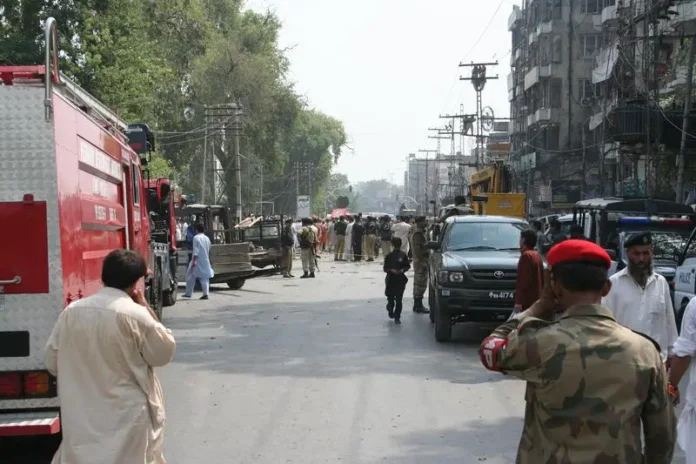A suicide bomber detonated explosives outside a district court in Islamabad on Tuesday, November 11, 2025, killing 12 people and wounding at least 27 in one of the most significant attacks to strike Pakistan’s capital in recent years. The blast occurred around 12:30 PM local time near the entrance of the court complex, an area typically crowded with hundreds of visitors attending hearings.
Interior Minister Mohsin Naqvi told reporters the attacker tried to “enter the court premises but, failing to do so, targeted a police vehicle” outside the gate. The discovery of a severed head at the scene, which police said belonged to the bomber, confirmed the nature of the attack. CCTV footage later captured images of the attacker before the explosion.
The casualties were mostly passersby or individuals who had arrived for court appointments, according to Islamabad police. Witnesses described scenes of chaos in the immediate aftermath, with the blast heard for miles across the city. Police quickly cordoned off the area as smoke rose into the sky, and ambulances rushed more than a dozen badly wounded victims to nearby hospitals.
Reports indicate that Jamaat-ul-Ahrar, a breakaway faction of the Tehreek-e-Taliban Pakistan, claimed responsibility for the bombing. The TTP is a separate militant organization from Afghanistan’s Taliban but maintains close ties with the group. Naqvi blamed “Indian-backed elements and Afghan Taliban proxies” linked to the TTP for carrying out the attack, though he added authorities were “looking into all aspects” of the explosion.
The bombing in Islamabad came just hours after Pakistani security forces foiled an attack on an army-run cadet college in Wana, South Waziristan, in Khyber Pakhtunkhwa province. That assault, which began Monday night, involved a suicide car bomber and five other attackers who attempted to storm the facility. A gun battle ensued that lasted nearly 20 hours, resulting in the deaths of three soldiers and all the attackers.
Defense Minister Khawaja Asif declared that Pakistan is in a state of war following the twin attacks. He laid blame on Afghanistan’s Taliban government, which Islamabad accuses of sheltering the TTP. Pakistan has seen a surge in militant attacks in recent years, with over 600 TTP attacks reported across the country in the past year, according to security analysts.
On Friday, November 14, Pakistani authorities announced a breakthrough in the investigation with the arrest of four suspects in a joint operation by the Intelligence Bureau and Counter-Terrorism Department. One of those detained, Sajid Ullah, is believed to have handled the bomb used in the suicide attack, according to government statements.
During interrogation, Ullah told investigators that Saeed-ur-Rehman, a TTP commander also known as Daadullah, ordered the attack through the Telegram messaging app. The commander sent Ullah photographs of the suicide bomber, an Afghanistan citizen from Nangarhar province, with instructions to receive him after he crossed the border from Afghanistan into Pakistan. Ullah arranged accommodation for the attacker near Islamabad and later retrieved an explosive suicide vest from a graveyard in the northwestern city of Peshawar on Daadullah’s instructions before transporting the vest to the capital.
The government said Daadullah, originally from Pakistan’s Bajaur region, is part of TTP’s intelligence wing and currently hiding in Afghanistan. The revelation underscored Pakistan’s longstanding accusations that Afghan Taliban authorities provide safe haven to TTP militants.
Tensions between Pakistan and Afghanistan have escalated sharply in recent months. Cross-border fighting erupted in October 2025, killing dozens of soldiers, civilians and militants on both sides before Qatar brokered a ceasefire on October 19. That ceasefire remains in place, but diplomatic relations remain strained.
Two rounds of peace talks have been held in Istanbul to address the security crisis, with the most recent session occurring on Thursday, November 7. However, both rounds ended without agreement after Kabul refused to provide written assurance that the TTP and other militant groups would not use Afghan territory to launch attacks against Pakistan.
Foreign Ministry spokesperson Tahir Andrabi thanked Qatar and Turkey for facilitating the dialogue between Pakistan and Afghanistan. He said Pakistan remained committed to resolving issues with Kabul through negotiation, noting that when the Taliban came to power in Afghanistan, Pakistan expected the government would eventually control attacks emanating from Afghan territory.
Andrabi said Kabul is attempting to give the impression that militants hiding in Afghanistan are refugees. “This is not a humanitarian or refugee crisis but a ploy to frame terrorists as refugees,” he stated, adding that some elements within the Afghan Taliban have “engaged in abuses and outrageous allegations against Pakistan and, in doing so, they are fast eroding whatever goodwill they had within Pakistan.”
Prime Minister Shehbaz Sharif condemned both attacks and called for full investigations. He offered to undertake talks with Afghanistan’s Taliban-led government in a renewed peace overture while urging Kabul to rein in the TTP. The strikes represent a serious challenge to Pakistan’s security apparatus, particularly as violence previously concentrated in northwestern border regions now reaches the heart of the capital. Until Tuesday’s blast, Islamabad was considered significantly safer than the country’s northwest, which has suffered from repeated militant violence.

